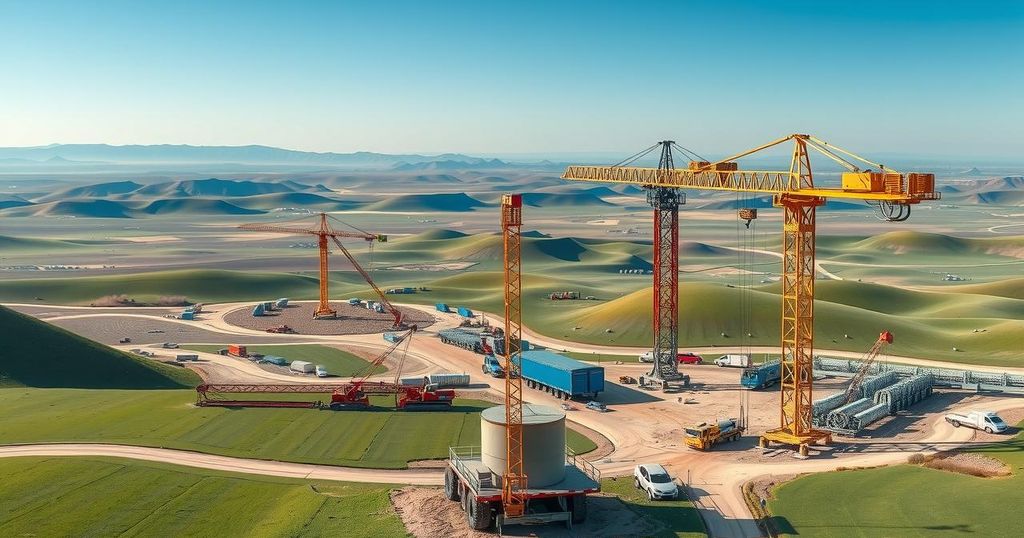Mongolia is advancing megaprojects to process its mining resources domestically and enhance its economy. A focus on industrial capacity aims to shift raw material exports to finished products, with plans sparked by public demand. Despite the financial and environmental challenges, the government prioritizes these initiatives to boost per capita GDP and energy independence, while navigating mixed public opinions.
In Mongolia’s Gobi Desert, trucks transport coal and copper to China for processing. Although the mining sector has significantly benefited the country for nearly two decades, leaders are calling for increased industrialization within Mongolia to retain raw materials. Plans are underway to establish factories and expand infrastructure to enhance the country’s processing capabilities, addressing public demand for local value generation.
Bulgantuya Khurelbaatar, deputy speaker of the Ikh Khural and member of the Mongolian People’s Party, asserts, “People are much more keen to see results. They also want to see their livelihoods being uplifted significantly. This is only possible if we have significant, big projects. Megaprojects.” If successfully executed, these initiatives could transform Mongolia into a vital contributor to global supply chains by exporting finished products instead of raw minerals.
Notably, funding is a significant challenge, as these megaprojects demand billions of dollars in foreign investment. Environmental sustainability is also a concern, as rapid infrastructure development could threaten Mongolia’s natural beauty, wildlife, and nomadic culture. The government aims to enhance per capita GDP from $7,580 to $10,000, viewing these projects as essential to their economic strategy.
Among the fourteen identified megaprojects are mineral processing centers, dams, water diversion schemes, and power plants. Significant progress has been made on two initiatives, including a uranium mine project in Dornogovi, agreed upon with France, and a cross-border rail development with China that will facilitate coal exports.
Prime Minister Oyun-Erdene Luvsannamsrai seeks to advance energy independence, with plans for a 450-megawatt coal-fired power station and improved rail networks that will strengthen the mining sector. The timeline for these projects remains flexible, but they are prioritized in the government’s 2024-2028 action plan, facilitated by a coalition government formed after recent parliamentary elections.
The coalition has aided progress on critical agreements like the uranium deal with France, which may stimulate further cooperation, especially for projects that may meet opposition in rural areas. The Minister of Mining, Tuvaan Tsevegdorj, emphasizes responsible water management and the protection of nomadic traditions amidst the development of infrastructure.
Funding for these megaprojects is projected to come from private and foreign investments rather than taxpayer money. Noteworthy investments include a $1.5 billion commitment from Orano of France for the uranium mine and a $1.7 billion investment from India for an oil refinery, showcasing Mongolia’s strategy to attract significant foreign capital.
Despite historical tensions with foreign investors, officials like Tuvaan believe the administration is now adept at fostering a more stable investment climate. “We believe the Orano [uranium] project will bring a message to international investors that the Mongolian government is committed to foreign investment,” said Tuvaan.
Conversely, the megaprojects have also encountered skepticism among the populace. Concerns about dependence on mining, expressed by some politicians and citizens, highlight a desire for a more balanced economy that includes robust agricultural sectors. Jargalan Batbayar, a member of parliament, cautions against focusing solely on mining, fearing unsustainable national debt and creating unviable projects referred to as “white elephants.”
Government officials are reportedly receptive to public concerns, yet they remain firm in their commitment to advancing these megaprojects, understanding that such initiatives support both foreign and local investments. As stated by Deputy Speaker Bulgantuya, “We understand that there are varying voices. But at the same time, these big projects support foreign and even domestic investment and still need to go ahead.”
Mongolia is poised to embark on transformative megaprojects aimed at diversifying its economy by enhancing industrial capacity and processing capabilities for its mining resources. The government’s plans, which include multi-billion-dollar investments and infrastructure development, aspire to elevate per capita GDP and improve energy independence, while also navigating environmental and public concerns. As the administration seeks foreign investments and cooperation, it must address skepticism within the population regarding the implications of such projects on Mongolia’s traditions and economy.
Original Source: www.bne.eu




